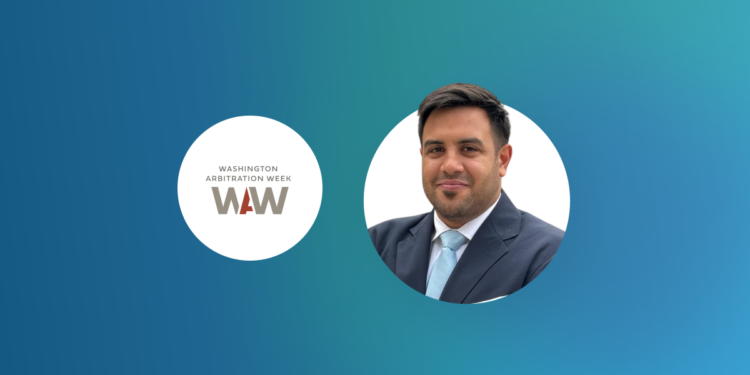THE AUTHOR:
Fernando Ayala, Consultant, La Nao Consulting
During the last day of the 4th edition of the Washington Arbitration Week (“WAW”), the panel “the first appointment as arbitration in investor-state cases: challenges and successes of four women arbitrators and institutional guide” took place. This panel was co-organized between WAW and the Club Español e Iberoamericano de Arbitraje (“CEIA”) and supported by CEIA Mujeres.
The panelists that congregated were Margie-Lys Jaime (University of Panama), Rainbow Willard (Willard Arbitration), Natalí Sequeira (International Centre for Settlement of Investment Disputes – “ICSID”), Mélanie Riofrio Piché (Riofrio IDR), Deva Villanúa (Devarb), Sabina Sacco (Sacco Arbitration), and Dyalá Jimenez (DJ Arbitraje). The moderator was Margarita Sánchez (Miller & Chevalier).
Jose Antonio Rivas (organizer and founder of WAW – founding partner of Xtrategy LLP) gave introductory remarks explaining WAW’s commitment to diversity of all types, including gender, nationalities, and languages. Therefore, the WAW organizing committee decided to organize this panel in Spanish. Additionally, he mentioned that one of the WAW’s objectives was to give visibility to new players in investment arbitration.
Empirical Data: Institutions Still Leading the Way
Natalí Sequeira set the stage by presenting the ICSID 2024 caseload statistics, which reflect an empirical perspective on gender diversity. She mentioned that ICSID has 158 Member States and 7 Signatories States. Each Member State can appoint four individuals to the list of arbitrators. Out of the entire list, only 25% are female. She further pointed out that, in 2015, women’s appointments were 12.6%, while in 2021, it increased to 26.1%. Also, Ms. Sequeira pointed out that most of the women’s appointments were made by institutions. Historically, between 1966 and 2023, the ICSID has appointed 14% of women arbitrators, while in 2023, it has appointed 22%. Then, she detailed the good practices that ICSID has implemented towards diversity. Her main takeaway was that despite an improvement, there is a long way to go.
The Building Blocks to Becoming an Arbitrator
Sabina Sacco explained that the arbitrators’ appointments are based on reputation and trust. This needs to be built around expertise, knowledge, and credibility. She advised that the first step should be to have an investment-arbitration-related position (either in a law firm, as an academic, or in an institution). Furthermore, she also advised working as a Secretary of an Arbitral Tribunal.
In Melanie Riofrio’s opinion, the three characteristics needed to get the first appointment are the following. First, the experience in investment arbitration and in some industry, practice, or field of law echoing Ms. Sacco. Secondly, to be a well-known lawyer in the arbitral community. Thirdly, there is a “luck” factor, the moment when preparation meets the opportunity.
Deva Villanúa pointed out that it is advisable to start as an arbitrator in commercial disputes and then jump to investment disputes. Building a reputation as a reasonable arbitrator mindful of investment disputes’ commercial background is important. In addition, she mentioned that any appointed young woman has the responsibility to do an exceptional job. If she does not, such misconduct may create a negative spill-over effect on other women. On the corollary, doing well will foster other female appointments.
Challenges Ahead
Dyala Jimenez moved to the topic of other challenges in investment arbitration. She mentioned that nowadays, double hating is less tolerated, if tolerated at all. Also, both investors’ and States’ demand for diversity has increased in appointments. Therefore, there is a great opportunity for young practitioners.
Sharing Know-How
The panelists went over their personal experiences, allowing for sharing “know-how”. Ms. Riofrio delved into her first experiences as an arbitral Secretary, where she learned about decision-making in Arbitral Tribunals and obtained great exposure. Secondly, Ms. Villanúa shared how her first appointment was made by networking at a conference several years after the meeting. In third place, Margie-Lys Jaime deepened the exchange on the importance of writing and academic work.
Another issue the panel dealt with was double hatting. Rainbow Willard mentioned the joint work of ICSID and UNCITRAL in drafting a Code of Conduct for Arbitrators in International Investment Disputes. Ms. Vinueva added that having balanced appointments between States and investors is preferable.
In conclusion, the panelists emphasized the importance of diversity. They acknowledged there is not a “one size fits all” single path to fixing diversity issues in arbitration. While increasing appointments is crucial for advancing women in the field, they also advocated for a quality-oriented approach, stressing the need to strike a balance in addressing double hatting and ensuring equitable appointments.
ABOUT THE AUTHOR:
Fernando Ayala is an Argentine lawyer who graduated from the University of Buenos Aires. He has taken postgraduate studies in arbitration and international business at the University of Mendoza and jointly at the University of Buenos Aires and the University of Geneva. In May 2024, he expects to finish his LLM at Georgetown University in Washington D.C., United States. He participated in and managed commercial arbitrations administered by the ICC, HKIAC, SIAC, and CIETAC. Among such arbitrations, he represented an Argentinian renewable energy company in an M&A arbitration, a Mexican industrial shipping company in a multi-million maritime arbitration, and many low-amount international sales of goods arbitrations.






